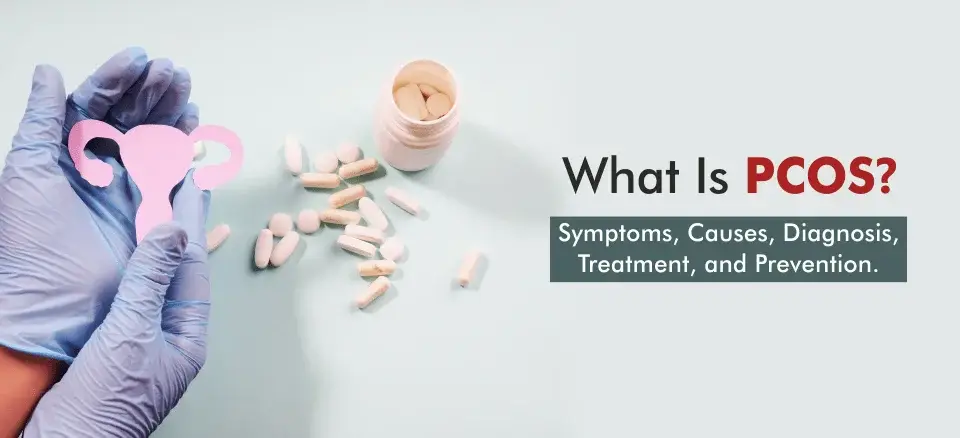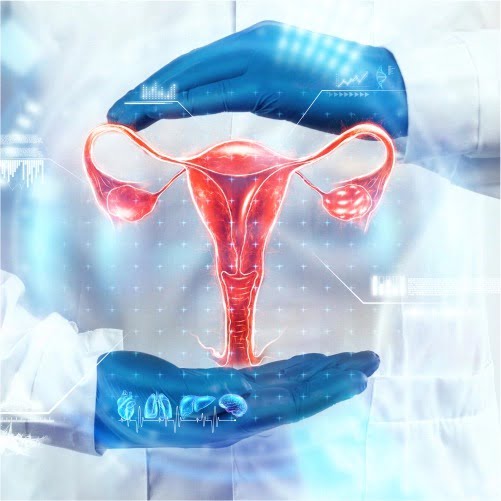


Women have to cope with tides of hormonal changes since their puberty constantly. All goes well if hormones stay balanced. On the flip side, several diseases can rear their ugly heads in case of imbalances. Polycystic Ovary Syndrome (PCOS) is one such problem.
It is a hormonal and metabolic disorder that wreaks havoc on a woman’s hormone levels. In this blog, you will read what exactly PCOS is, its symptoms, diagnosis, treatment, causes and prevention.
It is a condition when a woman’s body produces ‘male hormones’ or androgens more than normal levels. It is a pretty common disorder that affects between 5 and 10 per cent of women of reproductive age. Typically, PCOS can halt your periods or make them difficult to predict.
Women with PCOS lie at an increased risk of developing diabetes, heart disease, and uterine cancer at a later age, so it’s essential to be diagnosed and manager properly.
Let’s have a more profound look under the surface and understand the process linked with PCOS. First, this condition impacts the ovaries, the reproductive organs that produce progesterone, and estrogen. The ovaries are small, oval-shaped glands located on either side of the uterus.
Each month, follicles (tiny fluid-filled sacs containing eggs) mature in the ovaries. Hormones produced by the pituitary gland regulate your menstrual cycle and control the release of eggs from the follicles during a process called ovulation.
The egg travels to one of your fallopian tubes, and if it meets up with a sperm cell there, you become pregnant. If not, your uterus sheds its lining at the start of your period as progesterone (a hormone released after ovulation) levels drop. Sometimes that doesn’t happen because an imbalance in hormones prevents some of these steps from working properly.
In PCOS, there’s too much luteinising hormone (LH), which stimulates follicle development, and too much insulin produced in response to high blood sugar levels—known as hyperinsulinemia—which both contribute to excess production of ovarian androgens such as testosterone and DHEA, or dehydroepiandrosterone (DHEA-S).
That leads to irregular periods or no menstruation at all since you don’t have enough estrogen for a regular menstrual cycle or ovulation to occur.
Some common PCOS symptoms and signs include irregular menstrual periods, scanty bleeding, excess androgen (male hormone), acne, weight gain, depression, anxiety and difficulty getting pregnant (infertility).
PCOS weaken the ovaries’ ability to make and release eggs. In fact, you may not even discover PCOS until you try to get pregnant without success and visit the doctor for a diagnosis.
Many women with PCOS experience unanticipated weight gain. However, being obese or sudden weight fluctuations don’t always indicate PCOS. The disorder is common in thin ladies as well.
Women riddled with PCOS may have signs of insulin resistance such as velvety patches of skin around the neck, groin and armpits, skin tags, etc.
The lack of progesterone leads to irregular periods. As a result, you may feel that the period cycle is longer than desired.
PCOS can result in hirsutism, i.e. excess hair growth on the body and face. It may even lead to male-pattern hair loss on your scalp. Moreover, acne might be an outward symptom representing high androgen levels.
Depression, eating disorders, anxiety and poor body image are common problems in women with PCOS.
PCOS may run in families. If you have a sister or mother with it, you’re more likely to develop it yourself. However, no one knows why some women get this disease and others don’t.
It’s not entirely clear what causes PCOS. Still, the condition may likely be related to a variety of factors, including:
The exact cause of PCOS isn’t known. This is why doctors are undertaking research to better understand and manage this condition.
There’s no specific test for PCOS diagnosis. Nevertheless, a primary care doctor or an ob-gyn can diagnose PCOS based on your medical history examination & ultrasound report, and laboratory tests. For instance, the doctor will ask about your menstrual cycles, weight changes, and personal or family history of diabetes.
The specialist will also perform a physical examination to look for signs of excess body hair, acne, and other health conditions associated with PCOS.
This syndrome is diagnosed based on the following criteria:
Must Read: How Can Ovarian Cysts Affect the Fertility Rate?

Treatment for infertility caused by PCOS may include the fertility drug, insulin-sensitising medications and assisted reproductive technologies.
With PCOS, you may need to consult with a specialist if you have problems in conceiving. A fertility expert will be familiar with the appropriate treatments and what’s most likely to work best for you. But regardless of whether or not your focus is on getting pregnant, it’s important to maintain a healthy diet and stick to a regular exercise routine.
Routine physical activity can help minimize health problems related to this disease and help keep your weight in check, too. Eating well can also help keep your weight under control — especially if you eat low-glycemic foods — and may improve ovulation as well as other symptoms of PCOS.
If you wonder how to cure PCOS permanently at home, tweaking your daily habits is the answer. Certain lifestyle changes can help relieve or prevent symptoms associated with PCOS. Here are some PCOS prevention tips to steer away from this disease:
Several studies suggest that eating a diet that mimics fasting can improve insulin sensitivity and lower blood sugar levels in people with PCOS. This type of diet consists mostly of vegetables, fruits, nuts, beans, and legumes, along with fish and chicken as protein sources. It may also help to slice down on processed foods.
Regular exercise helps increase insulin sensitivity in your body. This decreases the amount of insulin required to keep your blood sugar at normal levels if you have diabetes or prediabetes.
Exercise also helps reduce anxiety, depression and stress due to high testosterone levels in women with this problem. Aim for 30 minutes of moderate-intensity activity on most or all days of the week.
Weight loss is often an effective treatment for polycystic ovary syndrome because it increases insulin sensitivity and reduces the amount of male hormones produced by the body.
Losing just five per cent of your body weight can decrease symptoms such as irregular periods and hirsutism (excessive hair growth). Even more importantly, losing weight can help improve your overall health by reducing your risk for type-2 diabetes and heart disease.
PCOS may be quite a complex condition, but the good news is that there are ways to get it under control. With good lifestyle practices, an effective treatment plan, and regular screening, you should be able to manage your coditionn—and live a fulfilling life.
Amandeep Hospital is the best Obstetrics and Gynaecology hospital in the region, where you can expect a holistic diagnosis and treatment for PCOS. The hospital has a dedicated team of prominent Gynaecologists in Amritsar & Pathankot, offering personalised care for you and your loved ones. So, if you’re looking for best-in-class healthcare, visit Amandeep Hospitals or book an appointment today!
September 30, 2024
Recognize the Signs: Understanding Appendicitis Pain Symptoms
September 24, 2024
Unveiling the Truth: I-Pill Side Effects Every Woman Should Know
We use cookies to enhance your experience. By clicking "Accept", you agree to our use of cookies.